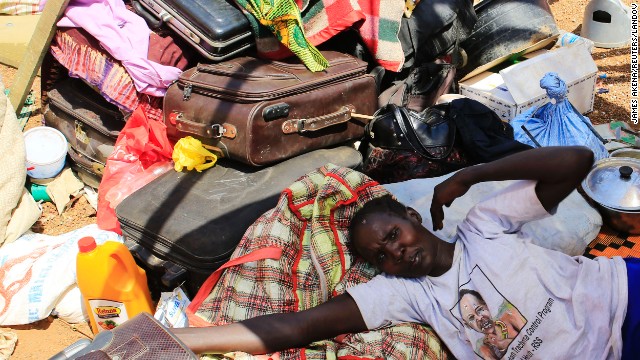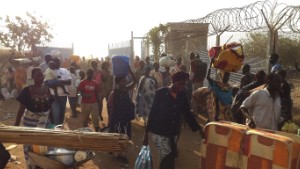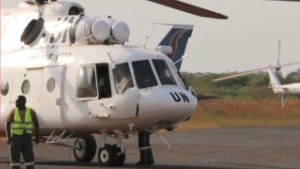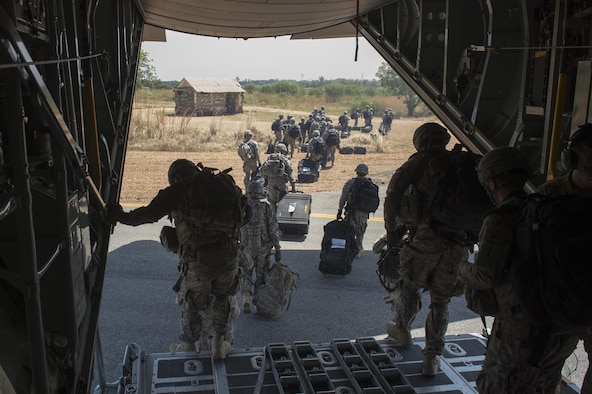U.S. Air Force Finally Talks About That Time Three V-22s Almost Got Shot Down
American troops had to abort rescue operation after taking damage and casualties in South Sudan
August 4, 2014
In December 2013, American troops aborted a rescue mission in South Sudan. Now, the U.S. Air Force finally has released additional details about the ill-fated operation.
They’re pretty frightening … and impressive.
On Dec. 21, three Air Force CV-22 Ospreys carrying commandos left
Camp Lemonnier in Djibouti, bound for the city of Bor in South Sudan. Widespread violence in the country following an attempted
coup d’etat had trapped American civilians.
At first, the Pentagon and Africa Command were vague about what happened next. An
official press statement said the aircraft had come under attack by forces on the ground and four unidentified “service members” were wounded.
The unique tiltrotors landed safely in Uganda. Official spokesmen described the casualties as being “in stable condition” and said the injured had gone to Kenya for extra medical attention.
These paltry snippets of information didn’t suggest the situation had been especially serious. But now in a
new official news piece, the Air Force describes a deadly serious chain of events that almost resulted in the destruction of the aircraft and the deaths of people aboard.
The operation kicked off according to plan. The CV-22s—which can fly like regular planes and land like helicopters—arrived on schedule at the United Nations compound in Bor, where the evacuees were sheltering.
The pilots from the 8th Special Operations Squadron then flew around the immediate area to check for any hostile fighters. The tiltrotors were about to land when someone attacked.
“The barrage of gunfire and RPGs from the ground hit the formation 119 times,” the 1st Special Operations Wing news report explains. In the end, all three Ospreys suffered severe damaged. Gunfire and shrapnel hit four special operators aboard the planes.
Three of the wounded troops were “in critical condition” and apparently could have died as the planes rushed to Entebbe airport in neighboring Uganda.
The injuries were so severe that medics “began drawing matching blood from personnel on board to ensure an immediate transfusion” when the aircraft touched down at Entebbe, according to the Air Force.
As if bleeding commandos weren’t bad enough, the enemy machine guns and rockets had broken the fuel lines in at least one of the aircraft. Aerial tankers—quite possibly the MC-130P Combat Shadows that also fly from Djibouti—rushed to the scene to top up the limping Ospreys’ tanks.
These harrowing details highlight the skills and quick thinking of America’s service members. The Osprey crews—now also identified by their callsigns Rooster 73, 74 and 75—will receive the 2013
Mackay Trophy for their actions.
The National Aeronautic Association presents this award to “the most meritorious flight of the year by an Air Force person, persons or organization.”
The flying branch picks the unit and the NAA—
a non-profit that promotes all things aviation—hands out the trophy at an annual event. The association also cites “the mobile blood bank” in its
official press release— and adds even more details about the operation.
The air commandos apparently had manually to run out the refueling boom on their aircraft when the tankers showed up. A hydraulic mechanism normally extends and retracts this probe.
NAA formally will recognize the crews of Rooster Flight in November.
Osprey Crew Members Recognized For Actions During South Sudan Ambush
August 24, 2014
As three CV-22s on a rescue mission descended on a U.N. compound in war-torn South Sudan, Capt. Arjun Rau saw something he’ll never forget — a bright red streak, headed straight at him.
“We were turning right, and I see a red tracer fly by my head,” Rau said of the Dec. 21 flight. “I thought it was a road flare. It turned out to be a tracer.”
His seat in the Osprey’s cockpit began to shake. Small-arms and heavy machine gun rounds peppered his aircraft, Chalk 2, and the two others in the flight. The carbon fiber floor started to shred and the armor under his seat began to rumble as rounds came through the aircraft.
“I thought about, initially, almost nothing,” Rau said. “I was kind of a little bit in shock at first over being shot at. But then everyone went right into thinking, ‘OK, what do we do next?’”
The Ospreys flew into the civil war raging in South Sudan on a flight to try to rescue American citizens in the city of Bor, the center of the violence. Four Special Forces troops were injured on the flight and 119 rounds hit the three Ospreys, but the crews’ quick thinking and prompt action prevented more casualties.
The Air Force recently awarded the 12 air crew members on the mission with the 2013 Mackay Trophy, awarded for the most meritorious flight in the Air Force that year.
Mission aborted
The Ospreys and crews from the 8th Special Operations Squadron were deployed to Djibouti from their home base of Hurlburt Field, Florida, for several months as violence raged in South Sudan. An attempted coup triggered violence across the country, two years after it had declared its independence from Sudan.
The airmen were told for weeks that American citizens could be under threat from the rebels and to form rescue plans if they were called into action. The U.S. Embassy in the capital city of Juba had evacuated at least 450 Americans and other foreign nationals. A U.N. helicopter was downed by small-arms fire the day before the Ospreys took off.
“Just leading up to our launch, there was a little bit of an uptick in violence,” Rau said.
The crews took action Dec. 21. The flight of three Ospreys flew about 750 miles through three countries to reach the U.N. compound in Bor, which had recently fallen into rebel control.In addition to the 12 aircrew members, the Ospreys carried 21 special operations troops for the mission.
The flight was uneventful, until they arrived at the compound, said Master Sgt. Alberto Delgado, who was a special mission aviator on the third aircraft.
When the Ospreys arrived, they circled the site and assessed the area before beginning their approach. They flew close to the ground and began to turn right as the first rounds were fired. Rebels hit the flight with small-arms, heavy machine guns and rocket-propelled grenades.
Chalk 2, Rau’s Osprey, took fire toward his cockpit. The lead aircraft, Chalk 1, took the heaviest fire, injuring four Special Forces troops. Chalk 3, Delgado’s Osprey, was also hit. The rescue was off, and the crew had new priorities.
“One of the first things that flew to my head is, ‘What are we going to do with the evacuees?’ ’’ Rau said. “There was a contingency plan put into effect, and the citizens were eventually evacuated shortly thereafter.”
The Ospreys scattered and rushed out of the area. Chalk 2 had the flight’s medic and he began assessing the injuries on Chalk 1 over the radio. While in flight, the medic began a mobile “blood bank,” requesting blood types of the crew and drawing blood.
The three aircraft had fuel leaks, structural damage and flight control failures, and still had to fly more than 500 miles to a waiting C-17 in Entebbe, Uganda, so the injured troops could be evacuated.
A C-130 that was standing by refueled the aircraft multiple times en route. The Ospreys finally landed an hour and a half after taking the first shots in Bor. The injured troops were then taken to Nairobi, Kenya, and all four survived.
'We took a lot of fire'
The CV-22 Osprey, once one of the military’s most controversial aircraft, has become a workhorse for Air Force special operations, thanks to their ability to operate in missions such as this.
“We took a lot of fire, we took a lot of damage,” Delgado said. “The aircraft proved to be very battle hardened.”
The tilt-rotor aircraft flies two- to three times as fast as a regular helicopter, Rau said, which allowed the crews to get out of the attack quickly and make it to Entebbe despite extensive damage.
“We were shot multiple times in multiple fuel cells,” Rau said. “The equipment didn’t explode. The leak was stopped.”
The crews in the mission credit the evasive maneuvers for preventing more casualties and getting the flight back to safety.
“One moment that will always stick with me was a Special Forces member approaching me a few months after the flight and asking if I was the aircraft commander of the flight he was on. I nodded yes,” Maj. Taylor Fingarson, the pilot of the third Osprey, said in an Air Force release on the mission. “He told me, as he heard the rounds hitting the aircraft, he felt me maneuver the Osprey in ways he didn’t know were possible. He told me I saved his life.”
Meritorious flight
The Mackay Trophy dates back to 1912 and has been presented for flights such as Chuck Yeager breaking the sound barrier and Operation Homecoming in the Vietnam War. Recently, it has been presented to pararescue crews for dramatic rescues in Afghanistan.
“It’s impressive, I’m very proud of that,” Delgado said. “It’s an honor to have our name on the same trophy.”
“I feel very insignificant, compared to the other award winners,” Rau said. “They are pretty inspirational and amazing. ... They did some very, very amazing things. ”
While the crews of the Ospreys will receive the trophyat a November ceremony, the award really goes to everyone who was involved in the mission, Rau said.
“Everybody performed so admirably that day. All the crew members on board our three aircraft, as well as our accompanying C-130 that gave us the critical air refueling. As well as the special operations team members onboard. Everybody went above and beyond,” he said.





 Reply With Quote
Reply With Quote A mother displaced by recent fighting in South Sudan rests on top of her belongings inside a makeshift shelter at the United Nations Mission in Sudan on Monday, December 23. Clashes between rival groups of soldiers in the capital of Juba a week ago have spread across the country.
A mother displaced by recent fighting in South Sudan rests on top of her belongings inside a makeshift shelter at the United Nations Mission in Sudan on Monday, December 23. Clashes between rival groups of soldiers in the capital of Juba a week ago have spread across the country. 



 Cannot play media. You do not have the correct version of the flash player.
Cannot play media. You do not have the correct version of the flash player. 
 James Copnall BBC Africa analyst
James Copnall BBC Africa analyst Cannot play media. You do not have the correct version of the flash player.
Cannot play media. You do not have the correct version of the flash player. 



 China will send troops to South Sudan
China will send troops to South Sudan Reuters
Reuters

Bookmarks